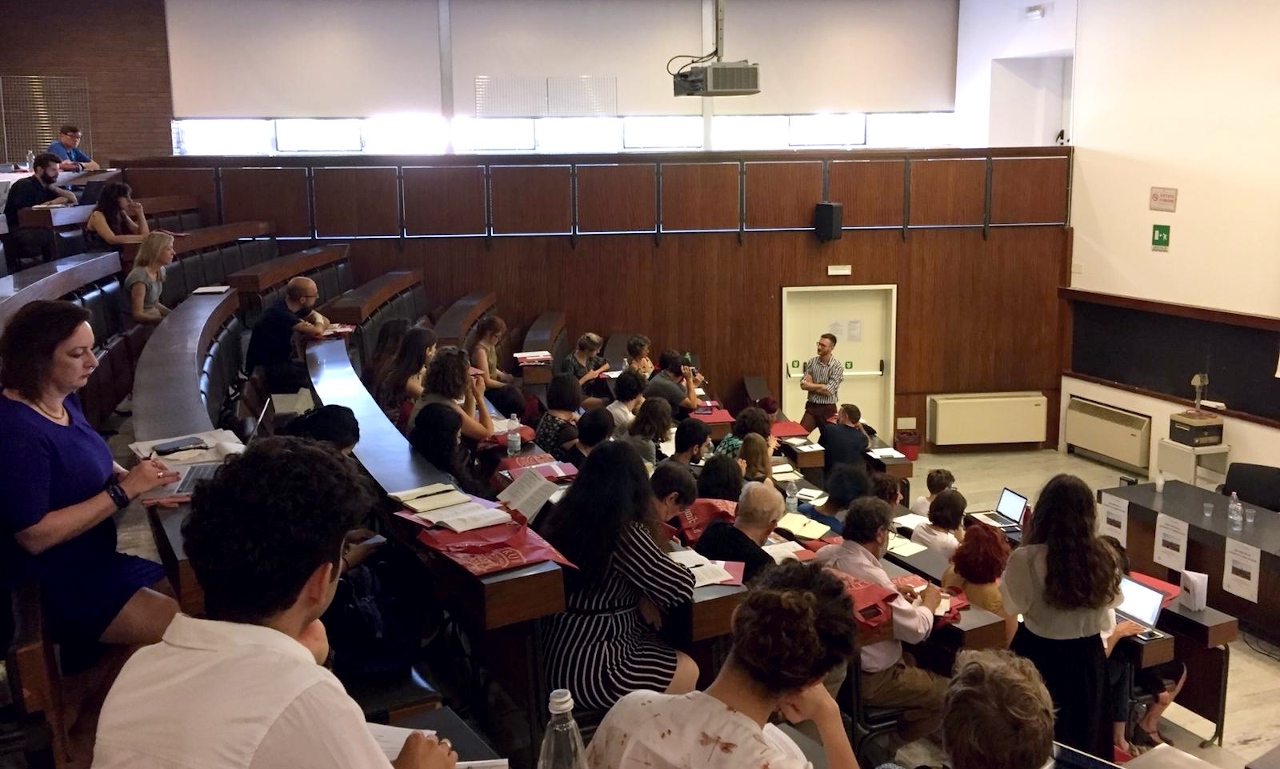Report on EASP Meeting: Intergroup Communication
11.09.2019, by Tina Keil in meeting report
June 26-28th, 2019 in Bologna, Italy; Scientific Committee: Michela Menegatti, Howard Giles, Silvia Moscatelli, Flavia Albarello, Antonis Gardikiotis, Andrea Carnaghi
 in total, 3 pictures
in total, 3 pictures
The EASP Meeting on Intergroup communication has been a successful event at multiple levels. At the scientific level, the diverse contributions of convenors showed that Intergroup communication, differently from other human behaviours which may necessarily need material artefacts and practical tools to be accomplished, is a very peculiar process, because it is continuously fed by human cognition, motivation, affect, and social influence. It can fuel discrimination and aggression or, in contrast, foster peace and harmony between individuals and social groups. The Meeting contributions showed precisely these two facets of Intergroup Communication, one destruens and conflictual, the other one construens and cooperative.
At the social level, the Meeting was a fruitful occasion of encounter among scholars of our scientific community. In our proposal to EASP, we referred to two main goals of the Meeting: a) bringing together researchers whose work pertains to intergroup communication in a diverse, interdisciplinary framework, and b) strengthening or building research networks among European and abroad, junior and senior scholars.
The first aim has been achieved by the accomplishment of the rich and articulated of the Meeting. The contributions showed that many scholars in Europe and abroad share research interests on Intergroup Communication, but also the diversity and specificity of approaches, ideas, paradigms and contests. Talks and posters dealt with communication concerning several minority groups, such as women, sexual minorities, migrants, refugees, and patients. They also considered communication and relationships between professional groups and the society, such as doctors, police, and politicians. Communication has been also analyzed as a means to maintain cultural and national identities, to fuel conflicts and hate, but also to promote reconciliation and peace and bring people together through contact. Finally, language and non-verbal communication has been examined as crucial social-cognitive processes in intergroup relations. The program has been complemented and further enriched by the keynote talks of three distinguished scholars, Naomi Ellemers (University of Utrecht), who presented her research on communication and morality, Francesca Prati (University of Oxford) who talked about contact and linguistic discrimination, and Cindy Gallois (University of Queensland) whose presentation concerned intergroup communication in health.
We also achieved the second aim by bringing together 91 scholars from all over the world: 66 from Europe (Italy, UK, Germany, Greece, Poland, Switzerland, Portugal, The Netherlands, France, Finland, Turkey, Russia), 6 from Asia (Israel, United Arab Emirates, Hong Kong, Philippines), 18 from North America (USA, Canada) and 2 from Australia.
Moreover, the interest of EASP members relies on the presence of 48 members, more than a half of participants. As anticipated, diversity was guaranteed not only in terms of countries but also gender (54 women) and career stage (43 junior scholars).
The opportunity to debate common research interests and build or renovate research networks has been facilitated by the plenary structure of the Meeting and, at the same time, the possibility to use a close room for small and further discussions. Moreover, Monica Rubini, member of the EASP Executive Committee, addressed the nature and goals of EASP in her opening and conclusive remarks by outlining how the Association promotes social psychology at large by its financial support to EASP Meetings, summer schools, joint networks, research of young members. She also invited non-members to apply to the Association.
All in all, we consider the Meeting a felicitous EASP event. We thank EASP for its support, the Scientific Committee (Michela Menegatti, Flavia Albarello, Silvia Moscatelli, Howard Giles, Antonis Gardikiotis, Andrea Carnaghi, Monica Rubini) and all administration colleagues of the Department of Psychology, Post-Docs, PhD and master students whose work has been crucial for the Meeting to take place.
Related content: